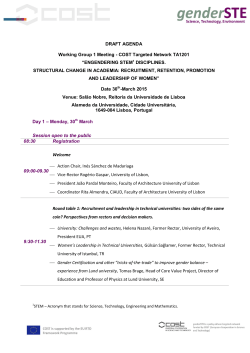
(In)equality and Transition to the Second Child in Dual
The Double Postponement | Final Seminar 20 th March 2015 | ICS-ULisboa | Lisbon Second Child Postponement: sociological accounts Gender (In)equality and Transition to the Second Child in Dual-earner Couples David Cruz, ICS-ULisboa The Double Postponement | Final Seminar 20 th March 2015 | ICS-ULisboa | Lisbon Fertility Transition to the second child Household Work Paid Work Women are still the main High rate of women employment responsible for care and chores (full-time work) and gender wage gap The Double Postponement | Final Seminar 20 th March 2015 | ICS-ULisboa | Lisbon Proportion (%) of women with at least one and two children's in PT (at the end of reproductive life) 100 80 91 87 87 86 71 56 60 51 44 40 20 0 1981 1991 One children 2001 2009 Two children’s Statistical Source: Human Fertility Database The Double Postponement | Final Seminar 20 th March 2015 | ICS-ULisboa | Lisbon Activity Rate (%) by Sex and Age Group (Portugal, 1992-2013) 100 95 90 85 80 75 1992 1993 1994 1995 1996 1997 1998 1999 2000 2001 2002 2003 2004 2005 2006 2007 2008 2009 2010 2011 2012 2013 70 M 25-34 M 35-44 W 25-34 W 35-44 Statistical Source: Statistics Portugal The Double Postponement | Final Seminar 20 th March 2015 | ICS-ULisboa | Lisbon + 3.4 hours Paid Work Men more than women (2012) Statistical Source: Eurostat, Labour Force Survey. + 14 hours Household Work Women more than men (2011) Statistical Source: Third European Quality of Life Survey, 2007-2011. 91% Leave for the care of children 85% Extended Parental Leave Women's (2012) Women's (2012) Statistical Source: Statistics Portugal. Statistical Source: Statistics Portugal. The Double Postponement | Final Seminar 20 th March 2015 | ICS-ULisboa | Lisbon 12 Individuals and 6 Couples (first partnerships and one step-family) Lisbon Metropolitan Area Range between 34 and 46 years of age The Double Postponement | Final Seminar 20 th March 2015 | ICS-ULisboa | Lisbon The Double Postponement | Final Seminar 20 th March 2015 | ICS-ULisboa | Lisbon The Double Postponement Men and women coping with childbearing intentions in their late 30s and early 40s The Double Postponement | Final Seminar 20 th March 2015 | ICS-ULisboa | Lisbon 1. Inequality and Disagreement “No way to have another child without his driving license! I would be at the hospital giving birth and who would take Laura to school?” (Maria, 35) - Reproductive decision-making process disagreement since early childbearing intentions; - Women are more likely to be in disagreement to a second child, even in a new partnership; The Double Postponement | Final Seminar 20 th March 2015 | ICS-ULisboa | Lisbon 1. Inequality and Disagreement Maria ♀ ▼ ▼ 1 .5 2 • .5 3 • .5 ♂ 4 .5 Paulo 5 - Dual-earner couples and full-time workers, but unequal wage and professional achievement; - Men's low participation in childcare; - Housemaid or relatives availability reduces women's burden. The Double Postponement | Final Seminar 20 th March 2015 | ICS-ULisboa | Lisbon 2. Equality and Receptiveness “I have a friend who doesn’t want to be a father. Why people make simple things so complicated? If even cavemen raise their children in a cave, nowadays we can do it too.” (Mário, 35) - Reproductive decision-making process agreement since early childbearing intentions; - Late transition to parenthood and male partner older; - Transition to the second child desired and planned by both partners; The Double Postponement | Final Seminar 20 th March 2015 | ICS-ULisboa | Lisbon 2. Equality and Receptiveness Sara ♀ 1 .5 2 •• .5 ♂ ▼▼ 3 .5 4 .5 Mário 5 - Dual-earner couples and full-time workers, highly educated women and professional achievement; - Men's participation in childcare and house tasks. The Double Postponement | Final Seminar 20 th March 2015 | ICS-ULisboa | Lisbon 3. One and Done (Equality and Acceptance) “You see… he has changed. He began to participate more, he became more dynamic. He is more into things… the housework, the expenses. And I became aware of his support… I realize now that he is there for me. I feel that if I need…” (Monica, 35) - Early transition to parenthood; - Low education qualifications level and low income household; - Acceptance of the financial difficulties of have a two child family; The Double Postponement | Final Seminar 20 th March 2015 | ICS-ULisboa | Lisbon 3. One and Done (Equality and Acceptance) Mónica ♀ ♂ ▼▼ 1 .5 2 .5 •• 3 .5 4 .5 João 5 - Participation in childcare and housework or “man in trouble”; - Grandparents/relatives availability importance. The Double Postponement | Final Seminar 20 th March 2015 | ICS-ULisboa | Lisbon 4. Equality and Uncertainty “When I lived with L. [ex-spouse] we didn’t talk too much about have or don’t have children’s. Our relationship didn’t… we weren’t interested on having children. (…) In my point of view, I didn’t want children’s because... I'm a bit skeptical about the world and our society. It’s the responsibility [of having children’s] that scares me!” (Julio, 46) - Profile often associated with step-families; - Resistance to transition to the parenthood/second child being explained by non-conventional factors. The Double Postponement | Final Seminar 20 th March 2015 | ICS-ULisboa | Lisbon The Double Postponement Gender (In)equality and Transition to the Second Child in Dual-earner Couples david.cruz@ics.ulisboa.pt http://duploadiamento.wordpress.com/
© Copyright 2025









